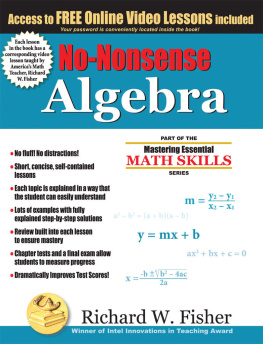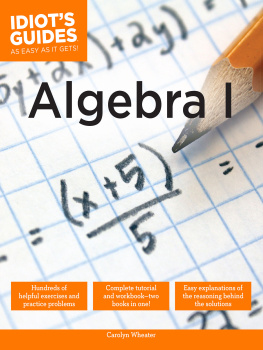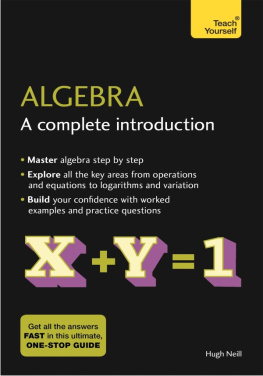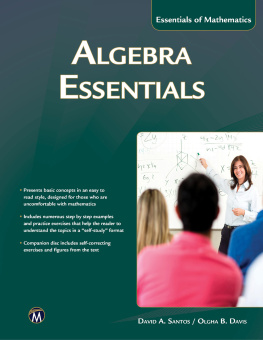ALGEBRA
IN
WORDS
A Guide of Hints,
Strategies and
Simple Explanations
Gregory P. Bullock, Ph.D.
Copyright 2014 Gregory P. Bullock, Ph.D.
All Rights Reserved. This book may not be used or reproduced in part, in whole, or by any other means whatsoever without written permission.
Bullock, Gregory P.
Algebra in words: a guide of hints, strategies and simple explanations
MATHEMATICS/Algebra/General
STUDY AIDS/Study Guides
First Edition
The United States of America
Table of Contents
INTRODUCTION
What Is This Book?
This book is a guide of common math and algebra topics that are explained in a non-traditional way. It is not a textbook, nor is it a conventional study guide. This is a book where basic mathematical and algebraic topics are explained in laymens terms, sometimes even purposefully redundant terms, to make your understanding easier and your learning curve faster. Its more of a guide of supplemental information and perspectives on the math you must learn.
I tutored Calculus for the Math Department in undergraduate school as a part-time job, then began teaching math at the collegia te level (Basic Math and Arithmetic through College Algebra/Pre-Calc I) in 2009 to a wide range of students of various ages and math education backgrounds. During that time, I began noticing trends among my students and classes. One major trend I noticed was the divide among people who seemed to get it, and those who didnt get it as easily, as quickly, or in the same way as those who did. Although its pointless to classify students into groups, my job as an instructor is to help bridge the gap and find mechanisms to help everyone get it.
As my teaching style evolved, I noticed that a lot of math (either in the books or traditional lectures) was taught in a sort of math language, meaning mostly in numbers, variables and lines of equations and simplification steps which is all well and good, because thats what math is. But I found that much o f it was left to interpretation, which some would get and some wouldnt. So I started translating the math into worded steps and notes and found that students responded positively to it. This was the bridge over the gap I was looking for. Since then, I began giving explicitly worded notes including, but not limited to, step by step instructions. Through observing common learning patterns among students, I also was able to predict common questions or areas of confusion, so I would give notes to preemptively answer questions such as
W hat do I look for? or,
When should I use this? or,
W hat will it look like?
and prepare students for frequent mistake areas by also showing what not to do , along with what to do.
These experiences inspired me to record my notes and make them available to any student who wishes they had another resource to make learning math and algebra easier. As I stated, this book is not a textbook, and by that I mean I dont give extensive examples and practice questions the way textbooks do. Math textbooks are generally very good at giving them and contain a wealth of information. But traditional textbooks also teach in a very rigid and often bottom-up way. Ive found that many textbooks teach certain topics to such a sub-categorical level of detail that students lose sight of how it connects to the bigger picture. So what I offer are other perspectives to the math from the textbooks, and I sometimes unveil them in a more top-down way.
I believe that:
- giving multiple perspectives,
- giving detailed, step-by-step instructions,
- showing examples with commentary,
- connecting key topics,
- translating math terminology,
- answering frequently asked questions,
- highlighting common mistakes, and
- drawing attention to some of the more minute (yet important) details which
sometimes slip under students radar, will expedite your ability to realize and absorb material. This will help you get better grades and save you valuable time, frustration, and even money (if it means you dont have to repeat a course). Sometimes students learn faster by seeing things in words .
In 2010, I published my first book GRADES, MONEY, HEALTH: The Book Every College Student Should Read , which is a collection of advice and stories on a variety of college-related topics geared towards helping students excel and get the most out of their college experience. In it, I dedicated 10 short chapters to how to get the best grades. In one of those chapters, I explain how important and helpful it is to listen to the words of your professors, and how taking notes on what they say is sometimes better than just trying to quickly record what they put on the board. Thats the basis of this book: Putting the math into words .
When I was writing GRADES, MONEY, HEALTH , I originally intended to include a chapter on some basic math and algebra hints, but my amount of material kept growing, and I wanted to keep the book as short as possible, so I kept the math segments out. Then my math-help-notes kept growing and ultimately developed into its own book this book, dedicated entirely to math and helping any and every math student.
This is Algebra in Words .
Why Do You Need Algebra?
Many students, especially those whose majors are not math or science, ask the questions, Why do I need algebra? or, When am I ever going to use this? These are completely valid questions. On one hand, that question can be asked about any general education class which does not seem to relate to ones major. The general stock answer is: Because it makes you more well-rounded. And thats true, but for many, that answer is still vague and unacceptable.
With regards to math specifically, many instructors put forth great effort and creativity to exhibit reasons and scenarios as to how math is used in everyday life. I applaud any and all instructors who can convincingly convey these answers. Unfortunately, most do not have the answers, and even more unfortunately, they tend to be:
- Will help you with money and personal finances ,
- Will help you with measurements around the house ,
- Will help you be a more efficient shopper ,
- You can help a child with their homework ,
- Will help you understand time signatures in music ,
- Will tell you how long it will take you and a friend to split a job ,
- Etc.
These answers are clich and unsatisfactory. These tasks require little to no algebra (although they do require an understanding of division, fractions, and decimals). But the truth is: there are resources (like smart-phone apps, or just a classic calculator) that do most, if not all of those functions for us. Another truth is: Those who really need and use algebra for their careers are a select few. However, that doesnt mean you have no use for it.
Heres the better answer to your question: Learning algebra makes you better at problem solving. It also makes you aware that there is order to the world we live in. Algebra is basically a series of rules; you might even consider it its own language. Everything in our lives relate to understanding rules to help us solve problems and navigate through life. That includes:
- Laws, the legal system, and contracts;
- rules, regulations , and strategies of sports and games;
- negotiations;
- learning a new language;
- critical reading;
- computers, smart devices and electronics;
- managing and working with people ;
- giving, taking and following directions;
- reading graphs, charts and data tables ;
- accomplishi ng tasks and goals of all sizes;
- and yes, even fixing things around the house.
Is it all solving for x? Obviously not, or at least not literally, but we can all benefit from learning how to navigate through rules (and) to solve problems. Algebra will help you be more logical and see life more logically.
Next page




